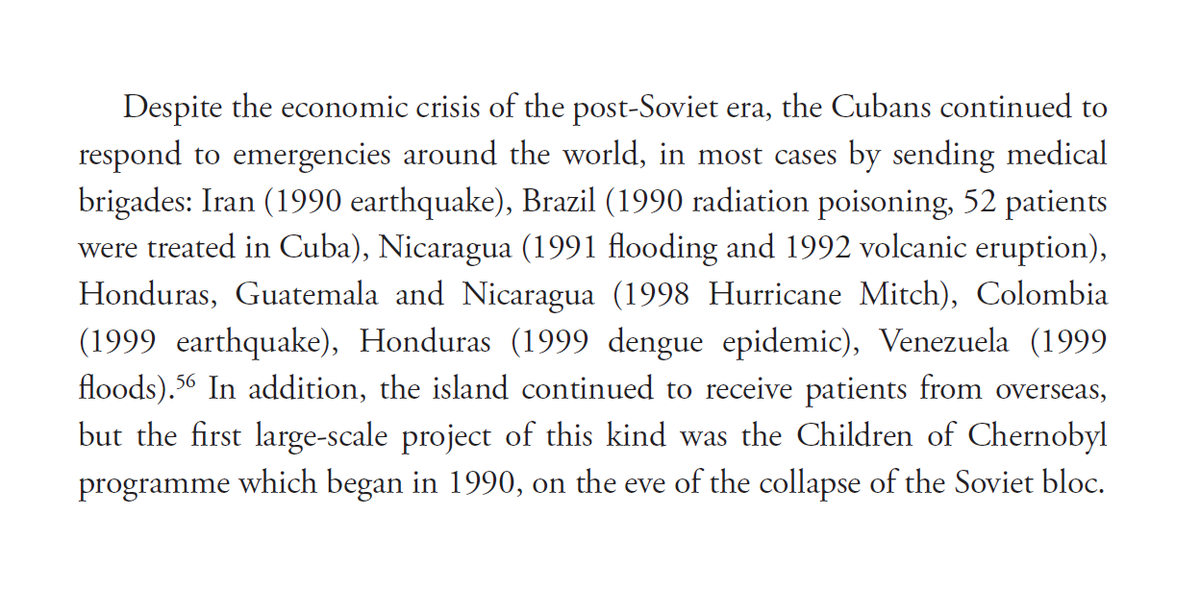. @zarahsultana is absolutely correct. Cuba has a long and proud history of medical internationalism, and the Henry Reeve Contingent deserves accolades for its remarkable work.
A thread on just some of Cuba’s public health achievements ↓
1/11
A thread on just some of Cuba’s public health achievements ↓
1/11

A small, poor Caribbean island has achieved health standards similar to those of wealthy countries. That itself is a magnificent accomplishment.
But Cuba has gone further: its medical internationalism is a reflection of the Revolution’s commitment to genuine solidarity. 2/11
But Cuba has gone further: its medical internationalism is a reflection of the Revolution’s commitment to genuine solidarity. 2/11
In the 1960s, Cuba: assisted earthquake survivors in Chile, sent the newly-independent Algeria medics after the exodus of French physicians, and vaccinated 61,000 Congolese children to combat a polio outbreak (the first mass vaccination campaign in Africa). 3/11
In decades that followed, Cuba’s medical assistance continued to grow.
In the 70s, Cuba sent medical brigades after earthquakes in Peru, Nicaragua, Honduras. Meanwhile, Cuba began training thousands of young medical students, mainly Africans, in Havana. 4/11
In the 70s, Cuba sent medical brigades after earthquakes in Peru, Nicaragua, Honduras. Meanwhile, Cuba began training thousands of young medical students, mainly Africans, in Havana. 4/11
In the 1980s, Cuba responded to disasters in Mexico, El Salvador, Ecuador and Nicaragua. And, by 1988, over 30 African countries were receiving Cuban support.
Even in the 1990s, during Cuba’s worst ever economic crisis, Cuba’s help for other countries never stopped. 5/11
Even in the 1990s, during Cuba’s worst ever economic crisis, Cuba’s help for other countries never stopped. 5/11
Cuba has aggressively sought to tackle the global doctor shortage, establishing the Latin American School of Medicine in 1999, training tens of thousands of international medical students.
To foster sustainability, Cuba also assists countries to train their own people. 6/11
To foster sustainability, Cuba also assists countries to train their own people. 6/11
By 2005, Cuba had built a standing army of 25,000 doctors who could be mobilised for World Health Organization programmes. It’s why they were so quick to respond to both the Ebola and the Covid-19 outbreaks, even assisting a ‘first world’ country like Italy last year. 7/11
The Henry Reeve Contingent was established in 2005. Fidel Castro said it would ‘give immediate assistance, with its specially trained staff, to any country that suffers a catastrophe, particularly those that are hit by hurricanes, floods or other [severe] natural phenomena.’ 8/11
Since then, the Henry Reeve Contingent has responded to disasters across the globe. From Kashmir to Haiti, to across West Africa during the Ebola outbreak, and now in tens of countries across the world during this Covid-19 pandemic. It is truly phenomenal. 9/11
Cuba has done all of this despite having faced a criminal blockade by the United States for sixty years. It shows what can be achieved when priorities are focussed on health rather than war.
Doctors, not bombs! We must learn from Cuba. 10/11
Doctors, not bombs! We must learn from Cuba. 10/11
You can read more about this in Dr @HelenYaffe’s recently released book, ‘We Are Cuba’. It’s a seminal text on Cuba in the post-Soviet era and contains a highly informative chapter on Cuba’s medical internationalism.
Buy it here:
https://yalebooks.co.uk/display.asp?k=9780300230031
11/11
Buy it here:
https://yalebooks.co.uk/display.asp?k=9780300230031
11/11

 Read on Twitter
Read on Twitter


